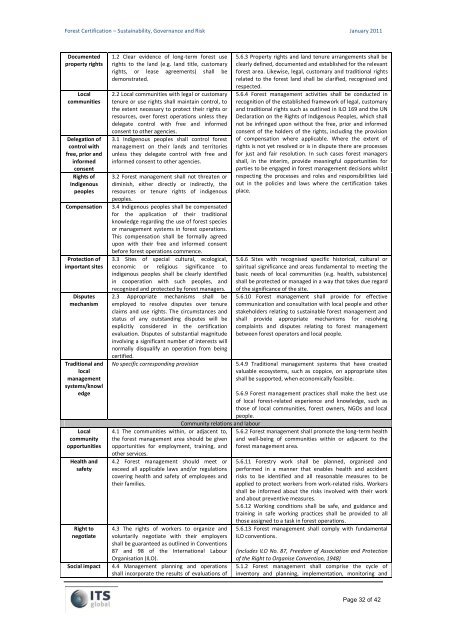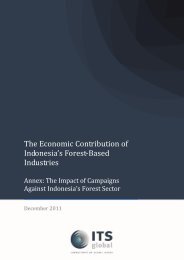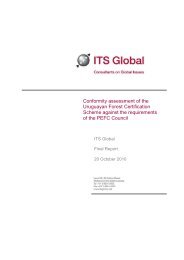Forest Certification â Sustainability, Governance and Risk - ITS Global
Forest Certification â Sustainability, Governance and Risk - ITS Global
Forest Certification â Sustainability, Governance and Risk - ITS Global
You also want an ePaper? Increase the reach of your titles
YUMPU automatically turns print PDFs into web optimized ePapers that Google loves.
<strong>Forest</strong> <strong>Certification</strong> – <strong>Sustainability</strong>, <strong>Governance</strong> <strong>and</strong> <strong>Risk</strong> January 2011<br />
Documented<br />
property rights<br />
Local<br />
communities<br />
Delegation of<br />
control with<br />
free, prior <strong>and</strong><br />
informed<br />
consent<br />
Rights of<br />
Indigenous<br />
peoples<br />
Compensation<br />
Protection of<br />
important sites<br />
Disputes<br />
mechanism<br />
Traditional <strong>and</strong><br />
local<br />
management<br />
systems/knowl<br />
edge<br />
Local<br />
community<br />
opportunities<br />
Health <strong>and</strong><br />
safety<br />
Right to<br />
negotiate<br />
Social impact<br />
1.2 Clear evidence of long-term forest use<br />
rights to the l<strong>and</strong> (e.g. l<strong>and</strong> title, customary<br />
rights, or lease agreements) shall be<br />
demonstrated.<br />
2.2 Local communities with legal or customary<br />
tenure or use rights shall maintain control, to<br />
the extent necessary to protect their rights or<br />
resources, over forest operations unless they<br />
delegate control with free <strong>and</strong> informed<br />
consent to other agencies.<br />
3.1 Indigenous peoples shall control forest<br />
management on their l<strong>and</strong>s <strong>and</strong> territories<br />
unless they delegate control with free <strong>and</strong><br />
informed consent to other agencies.<br />
3.2 <strong>Forest</strong> management shall not threaten or<br />
diminish, either directly or indirectly, the<br />
resources or tenure rights of indigenous<br />
peoples.<br />
3.4 Indigenous peoples shall be compensated<br />
for the application of their traditional<br />
knowledge regarding the use of forest species<br />
or management systems in forest operations.<br />
This compensation shall be formally agreed<br />
upon with their free <strong>and</strong> informed consent<br />
before forest operations commence.<br />
3.3 Sites of special cultural, ecological,<br />
economic or religious significance to<br />
indigenous peoples shall be clearly identified<br />
in cooperation with such peoples, <strong>and</strong><br />
recognized <strong>and</strong> protected by forest managers.<br />
2.3 Appropriate mechanisms shall be<br />
employed to resolve disputes over tenure<br />
claims <strong>and</strong> use rights. The circumstances <strong>and</strong><br />
status of any outst<strong>and</strong>ing disputes will be<br />
explicitly considered in the certification<br />
evaluation. Disputes of substantial magnitude<br />
involving a significant number of interests will<br />
normally disqualify an operation from being<br />
certified.<br />
No specific corresponding provision<br />
4.1 The communities within, or adjacent to,<br />
the forest management area should be given<br />
opportunities for employment, training, <strong>and</strong><br />
other services.<br />
4.2 <strong>Forest</strong> management should meet or<br />
exceed all applicable laws <strong>and</strong>/or regulations<br />
covering health <strong>and</strong> safety of employees <strong>and</strong><br />
their families.<br />
4.3 The rights of workers to organize <strong>and</strong><br />
voluntarily negotiate with their employers<br />
shall be guaranteed as outlined in Conventions<br />
87 <strong>and</strong> 98 of the International Labour<br />
Organisation (ILO).<br />
4.4 Management planning <strong>and</strong> operations<br />
shall incorporate the results of evaluations of<br />
5.6.3 Property rights <strong>and</strong> l<strong>and</strong> tenure arrangements shall be<br />
clearly defined, documented <strong>and</strong> established for the relevant<br />
forest area. Likewise, legal, customary <strong>and</strong> traditional rights<br />
related to the forest l<strong>and</strong> shall be clarified, recognised <strong>and</strong><br />
respected.<br />
5.6.4 <strong>Forest</strong> management activities shall be conducted in<br />
recognition of the established framework of legal, customary<br />
<strong>and</strong> traditional rights such as outlined in ILO 169 <strong>and</strong> the UN<br />
Declaration on the Rights of Indigenous Peoples, which shall<br />
not be infringed upon without the free, prior <strong>and</strong> informed<br />
consent of the holders of the rights, including the provision<br />
of compensation where applicable. Where the extent of<br />
rights is not yet resolved or is in dispute there are processes<br />
for just <strong>and</strong> fair resolution. In such cases forest managers<br />
shall, in the interim, provide meaningful opportunities for<br />
parties to be engaged in forest management decisions whilst<br />
respecting the processes <strong>and</strong> roles <strong>and</strong> responsibilities laid<br />
out in the policies <strong>and</strong> laws where the certification takes<br />
place.<br />
5.6.6 Sites with recognised specific historical, cultural or<br />
spiritual significance <strong>and</strong> areas fundamental to meeting the<br />
basic needs of local communities (e.g. health, subsistence)<br />
shall be protected or managed in a way that takes due regard<br />
of the significance of the site.<br />
5.6.10 <strong>Forest</strong> management shall provide for effective<br />
communication <strong>and</strong> consultation with local people <strong>and</strong> other<br />
stakeholders relating to sustainable forest management <strong>and</strong><br />
shall provide appropriate mechanisms for resolving<br />
complaints <strong>and</strong> disputes relating to forest management<br />
between forest operators <strong>and</strong> local people.<br />
5.4.9 Traditional management systems that have created<br />
valuable ecosystems, such as coppice, on appropriate sites<br />
shall be supported, when economically feasible.<br />
5.6.9 <strong>Forest</strong> management practices shall make the best use<br />
of local forest-related experience <strong>and</strong> knowledge, such as<br />
those of local communities, forest owners, NGOs <strong>and</strong> local<br />
people.<br />
Community relations <strong>and</strong> labour<br />
5.6.2 <strong>Forest</strong> management shall promote the long-term health<br />
<strong>and</strong> well-being of communities within or adjacent to the<br />
forest management area.<br />
5.6.11 <strong>Forest</strong>ry work shall be planned, organised <strong>and</strong><br />
performed in a manner that enables health <strong>and</strong> accident<br />
risks to be identified <strong>and</strong> all reasonable measures to be<br />
applied to protect workers from work-related risks. Workers<br />
shall be informed about the risks involved with their work<br />
<strong>and</strong> about preventive measures.<br />
5.6.12 Working conditions shall be safe, <strong>and</strong> guidance <strong>and</strong><br />
training in safe working practices shall be provided to all<br />
those assigned to a task in forest operations.<br />
5.6.13 <strong>Forest</strong> management shall comply with fundamental<br />
ILO conventions.<br />
(includes ILO No. 87, Freedom of Association <strong>and</strong> Protection<br />
of the Right to Organise Convention, 1948)<br />
5.1.2 <strong>Forest</strong> management shall comprise the cycle of<br />
inventory <strong>and</strong> planning, implementation, monitoring <strong>and</strong><br />
Page 32 of 42




